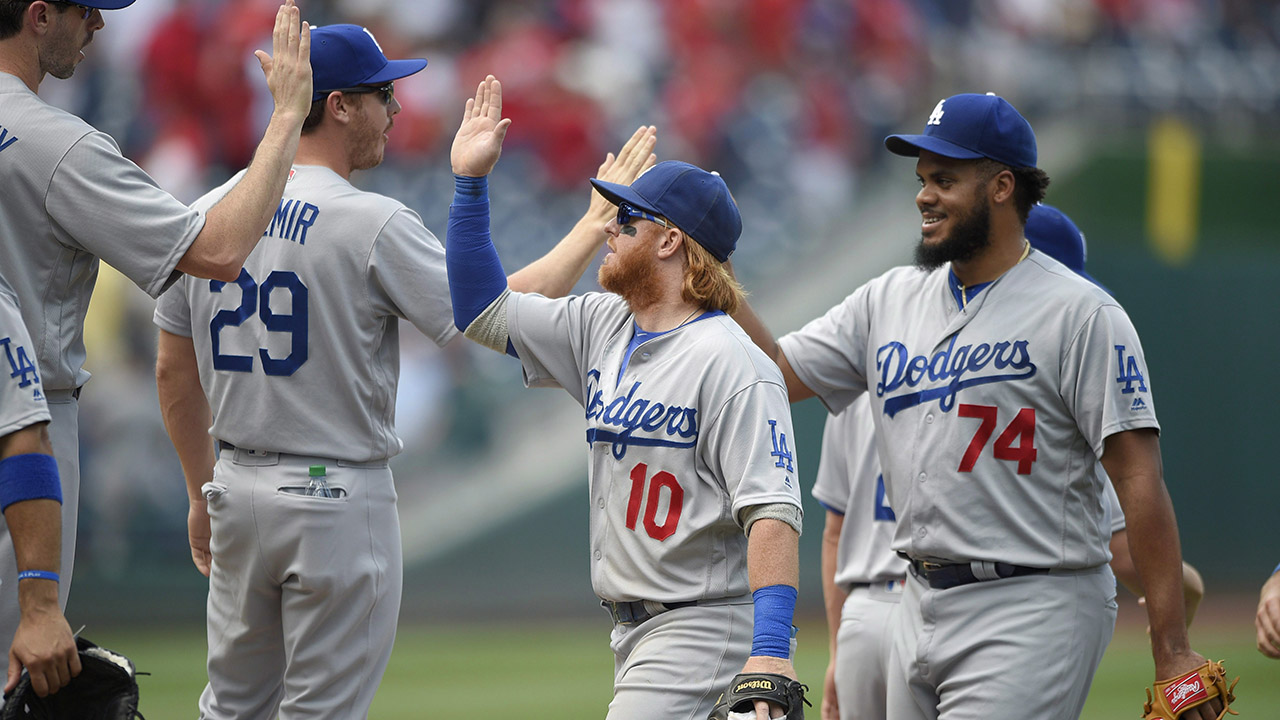TORONTO – Let’s, for a moment, go beyond the stunning financial commitment the Los Angeles Dodgers made to retain closer Kenley Jansen, third baseman Justin Turner and starter Rich Hill, and focus instead on the way the National League West champions brought them back.
Re-signing one free agent after he hits the open market, let alone three, is a significant feat, especially with the competition being particularly fierce for Jansen. Once other teams can enter the fray, there’s no way to fully predict the actual motivations of others and how that may sway negotiations.
Still, the Dodgers, to their credit, gave all three players time to assess the market and examine their options without rushing to find an alternative, understanding they wanted them back and the trio ultimately wanted to return.
The mutual interest is key and, obviously, being able to drop $192 million is pivotal, but the main takeaway for fans of the Toronto Blue Jays is the patience shown by Andrew Friedman and company.
Had the Blue Jays approached Edwin Encarnacion’s free agency in a similar fashion, he’d surely have ended up signing for something in the vein of that line-in-the-sand, $80-million, four-year offer.
Instead, Encarnacion understandably refused to be rushed into a decision (he’s earned that right), the Blue Jays almost immediately opened negotiations with Kendrys Morales, and within days completed a $33-million, three-year deal that effectively blocked off any chance of an Encarnacion return.
Given how much common ground there was, it’s an awful, awful way to part with a franchise icon.

Justin Turner, centre, and Kenley Jansen. (Nick Wass/AP)
The savvy and patience shown by the Dodgers in retaining their players are by no means outliers, as the Baltimore Orioles offered two examples last off-season.
They went into January with first baseman Chris Davis before giving him a $154-million, seven-year contract. And the Orioles gave reliever Darren O’Day about a month on the market before re-signing him for $31 million over four years last December.
An even better example came two off-seasons ago when the Detroit Tigers re-signed Victor Martinez to a $68-million, four-year deal. Like Encarnacion, Martinez wanted to test the market but was most likely to stay put, so then president and GM Dave Dombrowski gave him the space to talk to other teams, and then hit him with his best offer at the end of GM meetings, getting the deal done.
During the winter meetings last week, GM Ross Atkins noted that the Blue Jays "feel good about our strategy that we used" with Encarnacion, and felt compelled to act so quickly on Morales because, "we had opportunities in front of us that could’ve gone away and we didn’t want to see them go away."
That’s fair, and there’s an argument to be made that Encarnacion had a brief window in which to speak with other teams and that he should have understood that when the Blue Jays said $80 million over four years was their best offer, they meant it.
No matter how you cut it, the Blue Jays made a legitimate effort to bring him back.
At the same time, in free agency a team needs to be in it to win it to land the player.
As Friedman himself said at the winter meetings, "The free-agent market almost always plays out to the point of doing more than you rationally want to do. If you’re always rational about free agents, you will finish third on every free agent."
Atkins made a similar point when he said last week: "Free agency is so different because it’s all about desire. Look at Brett Cecil (getting $30.5 million over four years from the St. Louis Cardinals). It’s hard to use comps in free agency, because certain teams desire players more and that changes the market. You do use (comps) to position and you do use them for conversation starters and moves, but it ultimately comes down to how much you really want the player."
That proved apt when the Cardinals handed Dexter Fowler an $82.5-million, five-year deal landing a player the Blue Jays coveted by dishing out an extra year and more money. The Blue Jays are also believed to have topped out at $18 million over three years to Cecil.
The Dodgers reached agreement with Jansen for $80 million over five years, Turner for $64 million over four years and signed Hill to a $48-million, three-year deal. Jansen wanted to be back with the Dodgers so badly he left money on the table from the Washington Nationals to stay put.
Encarnacion might have done the same but the Blue Jays didn’t want to risk playing it out that long and coming up empty. It’s hindsight now, but with a Dodgers-like approach they would have gotten their man, at their price, too.
